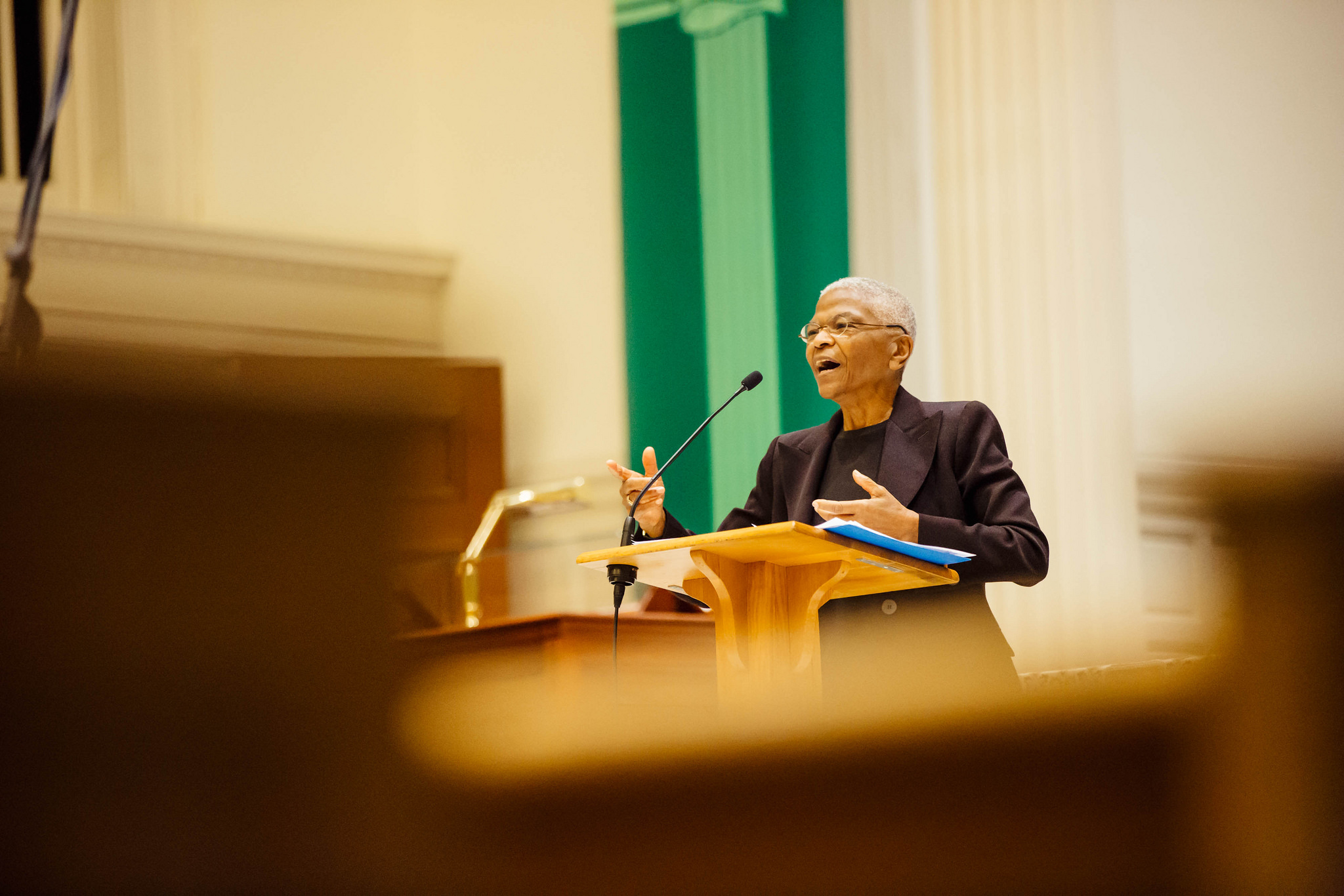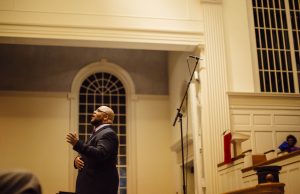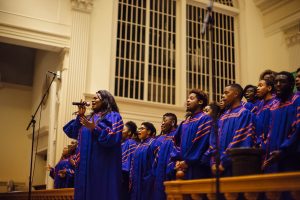
Dr. Mary Frances Berry was the keynote speaker at Gettysburg College’s 38th annual celebration of Martin Luther King Jr. Day (Photo courtesy of Gettysburg College)
By Kate Delaney, Staff Writer
Seeking to recognize those who continue The Rev. Dr. Martin Luther King Jr.’s work today fighting for the rights of those who often go unheard, Gettysburg College hosted its 38th annual celebration of Martin Luther King Jr. Day in Christ Chapel Monday evening.
The night began with music from the Biglerville High School Jazz Band and continued with an incredible performance by the Morgan State University Choir.

Dr. McKinley Melton, Assistant Professor of English, was among those in attendance (Photo courtesy of Gettysburg College)
Dr. Jennifer Bloomquist, the Associate Provost for Faculty Development and Dean of Social Sciences and Interdisciplinary Programs at Gettysburg, welcomed these groups and the audience that came to the celebration. Bloomquist also talked about her own background, as her father was African American and her mother was Caucasian. They were married in 1967, a time when an interracial marriage seemed unusual. Growing up, she always assumed her father was an outspoken leader of the civil rights movement, but she later found that he fought oppression in small ways. The way he conducted his business, voted in every election, and participated in rallies showed his willingness to make America a better place through small but meaningful acts and doing what he thought was right, she said.
Mary Alice Nutter was asked in 1979 how best to honor MLK, and she felt that an ongoing celebration and support for struggling students was the right way to go. Since that first event, 38 years ago, over 600 young adults have benefited from their fundraising efforts.
Later, The Rev. Dr. Kristin Largen, Chaplain at Gettysburg College, led the invocation. She spoke about how MLK believed we were all united in brotherhood, even with our enemies. She encouraged everyone to love their own enemies, but noted the distinction between love and like. Like is more about affection, while love has a redemptive quality. While there are many people not to like, everyone can be loved. She urged everyone to continue to ask God for peace, hope, and love, not only in the Gettysburg community, but throughout the world.
The Living the Dream Award was presented In Memoriam to Adrienne Kim, who died on January 29, 2017. Tanya Mincey accepted the award on her behalf, noting Kim’s passion for the community and her efforts in ensuring MLK Day was declared a holiday in Adams County.
Mary Englerth was also a recipient of this award for her efforts as a nurse for migrant workers. In the early 1960s, she was a nun in Peru, but after experiencing the effects of an earthquake there, she turned to medical care. Not only did she serve, but also she taught and trained many others to care for the people in a dangerous time. In Pennsylvania, she joined Keystone Health Clinic and greatly expanded services for migrants by securing a federal grant to start a migrant health program in 15 counties in rural Pennsylvania. There are now 37 such clinics. Englerth herself felt “honored and humbled” by the award, as Dr. King had always been among her heroes.
Two recipients of the Adams County Career Aid Project (ACCAP) also gave speeches discussing their appreciation of the support they have received. One recipient, Monica Hsu, discussed growing up in a one-person household, and having to pay her own way through college. She is now working toward a degree in Biology and will graduate next spring. She hopes to work as an OBGYN and work to empower women, thanks to the support ACCAP has provided. The other recipient, Arianna Camel, graduated from Gettysburg Area High School, made the Dean’s List at Millersville University, and graduated with honors in Social Work. She hopes to go on to graduate school to pursue her Ph. D, and thanked the MLK committee for their love, compassion, and support.
The keynote speaker of the evening was Dr. Mary Frances Berry, who served as Chair of the US Civil Rights Commission from 1993-2004 and has been an advocate for civil rights and equality through four presidential administrations.
Berry discussed current issues of injustice that America faces, such as equality for the LGBTQ community. Even brutality towards African American women in the 1960s that sparked riots never made it to the newspapers. Although there are many struggles that remain, there have been great strides towards equality, Berry argued. However, Berry asserted that the country must ensure that the Declaration of Independence and the Constitution are applicable to everyone. White supremacy is still very real, and there are too few minorities in positions of power, she argued.
She told the audience that there are many scenarios in which she finds herself asking, ‘What would Martin do?’ When she was in prison for protesting, she was with Coretta Scott King, and they asked each other, ‘What would Martin do?’ In the era of Trump, ‘What would Martin do?’ She argued that strategy and organization are essential. Voting and protests are incredibly important, and people must be held accountable in order to make progress. She noted that in order to make a change, someone has to get through the fire first.

